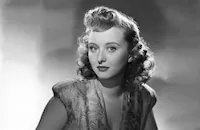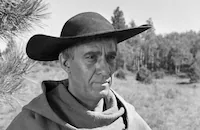Carnival in Costa Rica
Brief Synopsis
Cast & Crew
Gregory Ratoff
Dick Haymes
Vera-ellen
Cesar Romero
Celeste Holm
Anne Revere
Film Details
Technical Specs

Synopsis
Luisa, daughter of Rico and Elsa Molina, returns to Costa Rica from school in the U.S. to find that her parents have arranged for her to marry Pepe Castro, a family acquaintance whom she has never met. Pepe has also recently returned from the States, bringing with him his girl friend, Celeste, who plans to work in Costa Rica and become acquainted with Pepe's parents. When Pepe confesses he has not yet told his father about her, Celeste becomes suspicious, prompting him to tell her about the situation with Luisa. The Castros come to visit the Molinas for the formal introduction of the couple, but Pepe arrives wearing dark glasses and faking a bad cold. Once alone with Luisa, Pepe insists that he is sickly and later, at the Gran Hotel Estrada, Jeff Stephens, an American coffee buyer, learns that his evening flight has been canceled and to pass the time, takes a stroll around the plaza. During a kind of traditional flirtation promenade, Jeff meets Luisa and whisks her off to the El Sestéo nightclub, where she spots a very healthy looking Pepe dancing with Celeste. Luisa runs out of the club followed by Jeff. As it is fiesta time, they go on a ferris wheel ride and begin to fall in love. Back at his hotel, Jeff meets his old friend Pepe, who tells him about the predicament he is in without mentioning Luisa's name. The next morning, at breakfast, Jeff comes to serenade an elated Luisa and sends her flowers, asking her to meet him at his hotel by noon. As they walk to lunch, Luisa sees both Pepe and his parents approaching from different directions and makes her escape by jumping on a carnival float on which Celeste is appearing as "The Spirit of the Melon." Later, still feigning illness, Pepe takes Luisa dancing, and they meet Jeff escorting Celeste. Jeff pretends he doesn't know Luisa, and when Celeste discovers that Luisa is Pepe's intended, she tells her she can have him. Both sets of parents are also at the club and are introduced to Celeste and Jeff. Jeff reveals to Luisa's American-born mother that he, too, is from Kansas. After Celeste realizes that Luisa's father thinks she is still enamoured of Pepe, she pushes Pepe to tell him the truth. Later that night, Jeff drives Luisa home, and she invites him to a New Year's Eve party. Father Rafael, who has come to visit the family, sees the couple embrace, and when Luisa goes indoors for a coat, Jeff tells the priest that he is in love with her. Doubting their sudden love, the priest tells Jeff about the conservative courtship traditions of Costa Rica. The next day, Jeff begins to have doubts about the validity of his relationship with Luisa due to the differences in their backgrounds. At the New Year's Eve party Pepe and Luisa are thrown together, and he tells her that Jeff is leaving and is waiting in the lobby to say goodbye. After the couple part, Luisa disappears. Her concerned father phones Pepe's father, and they agree to meet at the hotel. There the fathers learn that Pepe has checked in with his new bride. Both fathers assume Pepe and Luisa have eloped and are stunned to discover that Pepe has actually married Celeste. Pepe tells them that Jeff and Luisa are in love and that she may have left with Jeff. The fathers find out that Jeff is still in town and is at Luisa's house. When they arrive there, they find Mrs. Molina calmly knitting. She tells them that she has given her and her husband's consent for the boy from Kansas to marry the girl from Costa Rica.

Director

Gregory Ratoff
Cast

Dick Haymes

Vera-ellen

Cesar Romero

Celeste Holm

Anne Revere

J. Carrol Naish
Pedro De Cordoba

Barbara Whiting

Nestor Paiva

Fritz Feld
Tommy Ivo
Mimi Aguglia
Lecuona Cuban Boys

Leonide Massine
Anna Demetrio
Severo Lopez
William Edmunds

Soledad Jiminez
Julian Rivero
Alfredo Sabato

Martin Garralaga
Juan Duval
Franco Corsaro
Paul Fierro
Billy Snyder
Tatiana Massine
Lucille Charles
Phyllis Graffeo
Rosita Delva
Frances Rey
Dolores Castelli
Carmen Pallais
Dorita Pallais
Vida Aldana
Alma Beltran
Anita Aros
Dora Del Rio
Elena Denver
Caroline Lopez
Tina Menard
Ernesto Zambrano
Rolando Barrera
Israel Garcia
George Navarro
Eddie Gomez
Jose Portugal
Crew
Manuel Arellano
William A. Bacher
José Barroso
James Basevi
Serge Bertensson
Otto Brower
Ralph Delara
Leonard Doss
Gaston Glass
Vicente Gomez
Roger Heman
Charles Henderson
M. Ruiz Herrero
Samuel Hoffenstein
Renè Hubert
Harry Jackson
Natalie Kalmus
Mark-lee Kirk
Ernest Lansing
John Larkin
Ernesto Lecuona
George Leverett
Edwin Linden
Thomas Little
Norman Manning
Leonide Massine
Arthur Morton
Emil Newman
Ben Nye
Edward H. Plumb
Elizabeth Reinhardt
William Reynolds
Gene Rose
Harry Ruby
Ad Schaumer
Fred Sersen
Sunny Skylar
Robert Snody
Herbert Spencer
Albert Stillman
Darryl F. Zanuck

Film Details
Technical Specs

Quotes
Trivia
the film's choreographer is the unnamed "famous dancer" with Vera-Ellen in the first production scene.
Notes
According to documents in the Twentieth Century-Fox Produced Scripts Collection and the Twentieth Century-Fox Records of the Legal Department at the UCLA Arts-Special Collections Library, during the writing stage this film was known as Tico-Tica and City of Flowers. Several of the songs performed in the film originally had Spanish lyrics by Ernesto Lecuona. Harry Ruby provided only the English lyrics. A second unit (with, possibly, Joe MacDonald as director of photography) shot scenics and process plates in and around San José, Heredia, Alajuela, Cartago and other areas of Costa Rica from early November 1945 until early January 1946. Veteran director Otto Brower, who headed up the second unit, died of heart failure, induced by a toxic condition, shortly after returning from Costa Rica in January 1946. Noted choreographer Leonide Massine appeared as Vera-Ellen's partner "Roberto" in the film's first dance number. Tatiana, Massine's four-year-old daughter appeared as Vera-Ellen's flower girl in a dream wedding sequence. Massine makes no reference to his work on this film in his autobiography, however. The MPAA/PCA file for this film in the AMPAS Library contains a costume check photograph from October 1945 featuring Jeanne Crain in the role of Luisa. Also in the file is a pre-production letter from PCA director Joseph I. Breen to Fox executive Colonel Jason S. Joy, expressing the PCA's pleasure that there is "a very definite disposition, on the part of all concerned, to make this picture a real contribution to a good understanding between the two countries. Particularly we want to commend the natural treatment of the characters, their portrayal as normal human beings devoid of phony picturesqueness, and the further fact that you propose to have them speak straight lines without any fake accents or dialects. . . . This is exactly in line with what we have been led to believe is the best possible portrayal of Latin Americans, and in fact, all foreign characters..."












